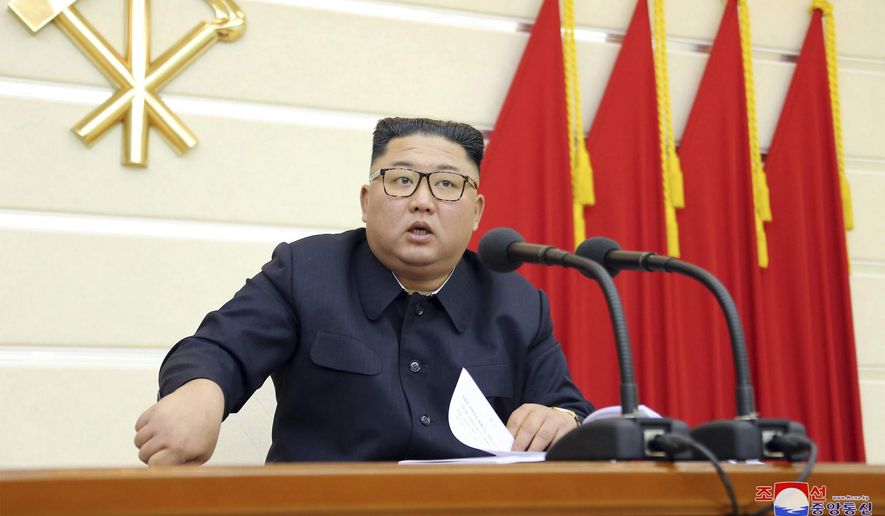Rumors continued to swirl Tuesday about North Korean leader Kim Jong-un’s health, even as South Korean and Chinese officials said they saw no evidence to back reports that claimed the secretive Mr. Kim was gravely ill following emergency heart surgery.
Trump administration officials said only that Washington was monitoring the reports, while analysts noted that speculation tends to swirl about North Korea because of its notoriously authoritarian controls on information — especially regarding the ruling Kim family.
Mr. Kim himself is critical to President Trump’s high-stakes nuclear diplomacy, with Mr. Trump saying the two have forged a relationship that could break through decades of diplomatic stalemate and military tensions.
“The truth is no one has the information. South Korea doesn’t have the information, China doesn’t have the information either,” said Frank Aum, a former U.S. negotiator with the North Koreans now with the U.S. Institute of Peace.
Asked about the status of Mr. Kim, Mr. Trump told reporters Tuesday night: “We don’t know. We don’t know. I’ve had a very good relationship with him. I can only say I wish him well.”
Officials in South Korea, which closely monitors it neighbor, were circumspect Tuesday in response to a CNN report Monday night about Mr. Kim’s health.
A senior official told South Korea’s Yonhap news agency the report was simply “not true,” and Kang Min-seok, a spokesman for South Korean President Moon Jae-in, said there had been “no unusual signs have been identified inside North Korea.”
National Security Adviser Robert C. O’Brien told Fox News that U.S. officials were monitoring reports “very closely,” but administration officials otherwise dodged questions on the matter throughout the day Tuesday.
The South Korean internet news outlet Daily NK, which focuses on news about North Korea, first reported that Mr. Kim had undergone surgery at Hyangsan Medical Center, said to be an exclusive hospital for the Kim family. The surgery was performed by a team of the country’s top doctors, who had traveled to Pyongyang for the procedure, the outlet said, citing only an unnamed source inside North Korea.
A U.S. official told The Associated Press the White House was aware before those reports appeared that Mr. Kim’s health might be precarious.
Mr. Kim may have undergone surgery and that complications may have rendered him “incapacitated or worse.” But the official stressed that the U.S. had nothing to confirm the reports.
Officials in China, which is a close ally to North Korea, also downplayed rumors about Mr. Kim. An official with the Chinese Communist Party’s International Liaison Department told Reuters they do not believe the North Korean leader is “critically ill.”
But analysts also noted Mr. Kim’s unusual absence from the April 15 festivities celebrating the birthday of his grandfather, Kim Il-sung, founder of the family’s Communist dynasty. It was the first time Mr. Kim had missed the ceremony since taking power in 2012. Analysts also note that the 36-year-old leader is overweight, smokes heavily, and has a family history of heart disease.
Mr. Aum told The Washington Times in an interview that speculation about Mr. Kim’s health is also fueled by the “lack of clarity about the line of succession” in the regime should the North Korean leader die suddenly.
“Right now there really isn’t a clear successor,” said Mr. Aum, who suggested the most likely candidate may be Mr. Kim’s younger sister Kim Yo-jong.
Mr. Kim’s known appearance came when he presided over a meeting on April 11, discussing coronavirus prevention and endorsing the election of his sister as an alternate member of the political bureau of the ruling Workers’ Party, according to North Korean state media reports.
“[She] has gained authority and exposure in recent months and years, perhaps sufficient to be the next leader to maintain the Kim bloodline. But nothing is certain,” former CIA Korea official Bruce Klingner said Tuesday.
“If Kim were sick, he may have designated her since she is likely the only person he trusts,” Mr. Klingner, a senior fellow with the Heritage Foundation, said in statement circulated by email.
“Some will speculate that Kim Jong-un’s death could lead to an explosion (lashing out at South Korea) or implosion (regime collapse, internal civil war, and potential loss of control of nuclear weapons),” Mr. Klingner said. “But the regime will instead likely have an orderly transition of power.”
He added that the “U.S. should be closely consulting with its allies South Korea and Japan to pool intelligence to monitor developments in North Korea as well as plan common policy responses while maintaining military vigilance.”
Unsurprisingly, the official North Korean state press carried no hints of any troubles for Mr. Kim. The top news stories in Pyongyang Tuesday, according to KCNA Watch, which tracks the North Korea press included a call to implement the state budget, an update on anti-COVID-19 efforts, and a congratulatory message sent by Mr. Kim to the president of Cuba on his 60th birthday.
• Guy Taylor can be reached at gtaylor@washingtontimes.com.




Please read our comment policy before commenting.